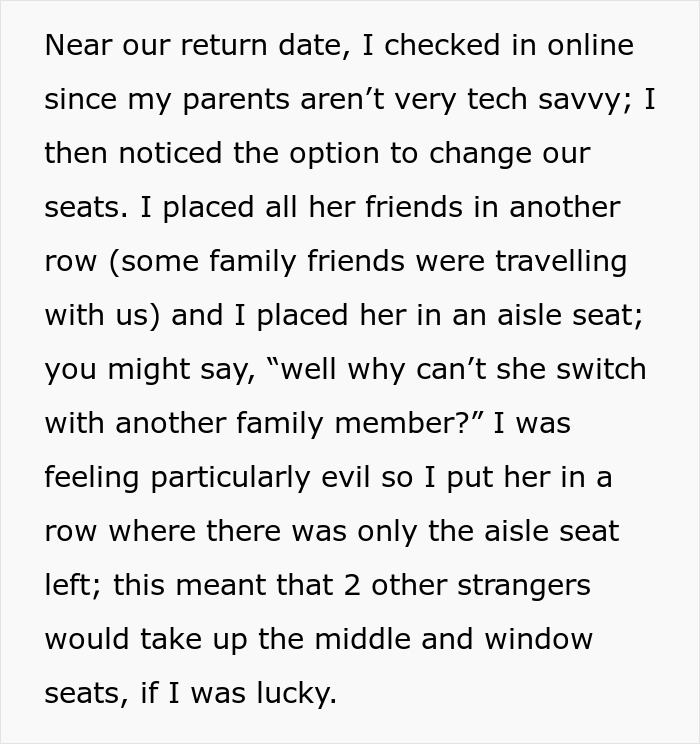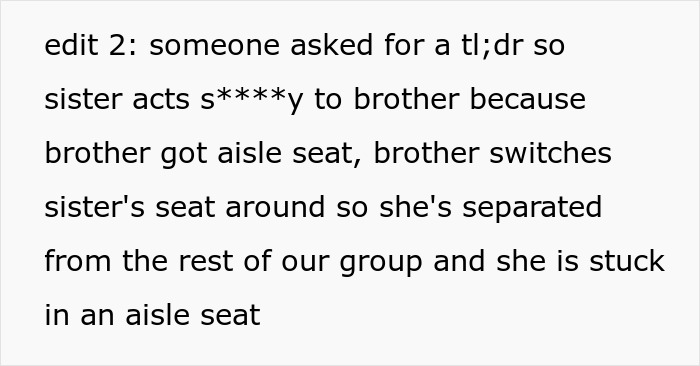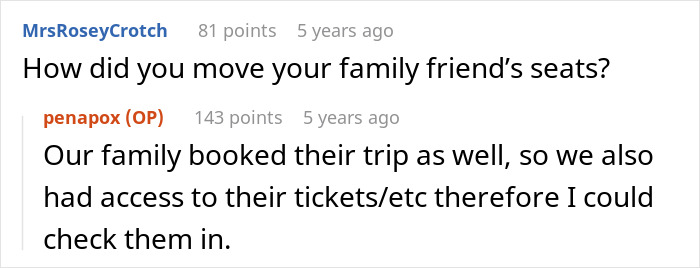Air travel these days is far from glamorous. In fact, it can be a downright pain in the butt. Beyond getting through airport security, you’re often treated like cattle, despite the ever-increasing air fares. Then there’s the added layer of traveling with strangers, often a little too close for comfort.
So, when Reddit user u/penapox went on a long flight with his family, he didn’t need his kid sister to add to the stress and make his journey uncomfortable. But she kicked up a fuss about wanting his window seat and his parents sided with his sibling, who then teased him about it for the whole flight. That’s when OP started plotting his revenge.
More info: Reddit
Modern air travel is already a hassle, so you don’t need your own sibling disrespecting you on top of everything

Image credits: Bao Menglong (not the actual photo)
Bratty sister begged and screamed for window seat on long flight, forcing brother to move to the aisle



Image credits: Clément Proust (not the actual photo)
Kid sister then proceeded to tease brother for the remainder of the flight to Toronto



Image credits: Dmitry Zmiy (not the actual photo)
He kept his cool despite the provocation, plotting his revenge for the flight home. He cunningly checked in his whole family online, putting his kid sister in an isolated aisle seat


Image credits: u/penapox
A degree of sibling rivalry is natural, and it can take on many forms. Teasing is just one of them but, in the wrong situation, it can lead to deep feelings of resentment. The age gap also makes a difference, with the youngest child often getting away with murder while the first-born typically has a tough time of it.
This was the situation when a Reddit user’s 8-year-old sister caused a scene on a flight to Toronto, forcing him to switch seats with her. As if being relegated to the aisle from the window seat wasn’t enough, he then had to endure his kid sister’s teasing and taunting for the rest of the flight. The drama didn’t stop there, though. The older brother turned to Reddit to tell the rest of his story.
According to u/penapox, he kept his cool, but used the remainder of the flight to think up ways he could get revenge for his sister’s bratty behavior. By the time the plane landed, he had made his decision. Near the family’s return date, he checked everyone in online (his parents aren’t that tech-savvy). That’s when he noticed the option to assign seats to each passenger. Since he was feeling particularly evil, he grouped everyone together (the family was traveling with some friends), but put his sister in an isolated aisle seat, where she’d be sitting next to two strangers. When it came time to board, he simply blamed her separation on luck.
Of course, the kid sister immediately kicked up another fuss, but the family was having none of it. Since it was a night flight and everyone was feeling grumpy, nobody was in the mood for her tantrum. To add insult to injury, the two strangers she was sitting next to just told her to quiet down. The result? Kid sister had to spend the whole flight back home stuck in the aisle.

Image credits: Chris Curry (not the actual photo)
In an article for The New York Times, opinion writer Jessica Grose delves into the psychology behind sibling rivalry. According to Jeanine Vivona, a professor of psychology at the College of New Jersey who has studied sibling rivalry, “competition with siblings is just a fact of life. And we, as people with siblings and people with children, can just try to manage it as best we can.”
Grose goes on to say that observational studies have shown that sibling conflict may happen up to eight times an hour. Says Mark Ethan Feinberg, a research professor of health and human development at Pennsylvania State University, “Early and middle childhood are particularly difficult times for sibling aggression. Conflict does decrease into adolescence; it sort of levels off.” Grose also writes that, psychologically, sibling rivalry serves a developmental purpose: It helps children figure out what is unique and special about themselves, otherwise known as “differentiation.”
Psychologist Susan Albers, PsyD, offers some helpful tips to create a peaceful, cooperative home environment. “A relationship with siblings is one of the earliest and long-lasting relationships people develop,” she says. “Siblings are a child’s first peer group where they learn critical social skills like how to share, how to manage conflict and how to communicate.”
Albers suggests the following tips: Pay attention to what your kids are doing so you can intervene before a situation begins or escalates. Keep your cool and your kids will learn to do the same. Avoid comparing your children, favoring one over the other, or encouraging competition between them. Instead, create opportunities for cooperation and compromise by empowering them to play together, explore their individual curiosities and share time with you.
“Role modeling is one of the most powerful and effective ways to teach your children how to get along with their siblings,” says Dr. Albers. “Show your children how to share by dividing up the last piece of pie or working together on a chore. Intentionally say sorry when you have a conflict with your significant other and let them hear you saying those words to each other.”
Children are less likely to fight if they feel you appreciate each of them as an individual. Start by avoiding labels and let each child know that they’re special to you by spending time with them individually. If one child loves to run around outside, grab your sneakers and soak up the sunshine with them. If the other child likes to spend time reading their favorite book, snuggle up next to them. Then, make sure that everyone has the space and time they need to be alone.
This means you should also avoid over-generalizing your child’s characteristics and personality traits. For example, saying one child is “the athletic one” and another is “the book-smart child” implies their value is dependent on performance in certain areas. Translation: Your athletic child may not feel as smart, and your book-smart child may not feel as physically fit — and these observations may foster animosity between them because of their labeled differences. Instead, empower your children for who they are as individuals without using labels that attach fault or guilt.
Family dinners, playing board games, spending time at the park and doing activities are great ways for children to bond and share positive memories together. These moments give children less incentive to pick fights with each other and give them an opportunity to spend more time with you. For parents, fairness is essential, but fair doesn’t always mean equal. Punishments and rewards should be tailored to your children’s individual needs. For example, you don’t have to give two children the same toy. Instead, give them different toys suited to their ages and interests. That kind of fairness will go a long way.
OP’s post received 5.7k upvotes and garnered 185 responses. What do you think of the brother’s act of revenge? Let us know in the comments!
The most upvoted comment was a simple, “I approve,” with many netizens echoing the statement





















